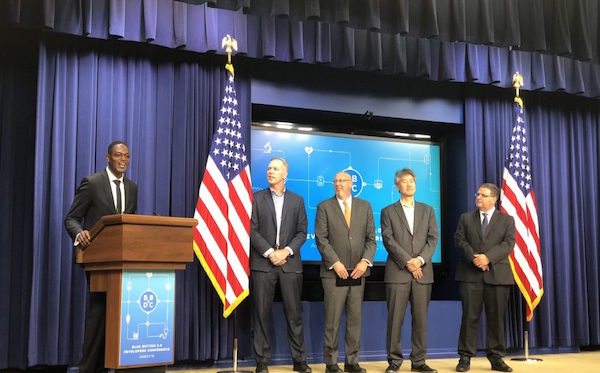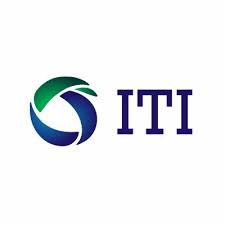 In June 2020, the Secretary-General of the United Nations published a "Roadmap for Digtal Cooperation." In this report, he expanded on recommendations made a year before, calling on all actors, including the Member States, the United Nations system, the private sector, and others, to promote digital public goods. He says to realize the benefits of increased internet connectivity, open source projects in the form of digital public goods must be at the center. While the term "digital public good" appears as early as April 2017, this report offers the first broadly accepted definition of digital public goods...The Digital Public Goods Alliance (DGPA) translated that definition into a nine-indicator open standard that we hope will serve as a comprehensive, shared definition to promote the discovery, development, use of, and investment in digital public goods for a more equitable world.
In June 2020, the Secretary-General of the United Nations published a "Roadmap for Digtal Cooperation." In this report, he expanded on recommendations made a year before, calling on all actors, including the Member States, the United Nations system, the private sector, and others, to promote digital public goods. He says to realize the benefits of increased internet connectivity, open source projects in the form of digital public goods must be at the center. While the term "digital public good" appears as early as April 2017, this report offers the first broadly accepted definition of digital public goods...The Digital Public Goods Alliance (DGPA) translated that definition into a nine-indicator open standard that we hope will serve as a comprehensive, shared definition to promote the discovery, development, use of, and investment in digital public goods for a more equitable world.
artificial intelligence (AI)
See the following -
Researchers Hid Malware Inside an AI's 'Neurons' and It Worked Scarily Well
 Neural networks could be the next frontier for malware campaigns as they become more widely used, according to a new study. The study, which was posted to the arXiv preprint server on Monday, found that malware can be embedded directly into the artificial neurons that make up machine-learning models in a way that keeps them from being detected. The neural network would even be able to continue performing its set tasks normally.
Neural networks could be the next frontier for malware campaigns as they become more widely used, according to a new study. The study, which was posted to the arXiv preprint server on Monday, found that malware can be embedded directly into the artificial neurons that make up machine-learning models in a way that keeps them from being detected. The neural network would even be able to continue performing its set tasks normally.
- Login to post comments
Robots Can Now Officially Imitate Humans
A computer that has convinced humans it is a 13-year-old Ukrainian boy has potentially passed a benchmark for artificial intelligence for the first time. The programme, named “Eugene Goostman” and created by Russian developers, managed to convince 33% of the judges that it was human at an event at the Royal Society in London, The Independent reported...
- Login to post comments
Robots in Healthcare - Will they do the Heavy Lifting?
 There are already robots in health care. Robotic surgery, delivery robots, robotic prescription dispensing systems, even therapeutic robots used in lieu of pet therapy But we've just scratched the surface, because we still think of care as being something that is delivered by a person. People like to talk about the importance of the human touch, but when it comes to something like getting out of bed when I want to, I think I'd rather have immediate service from a robot than an indeterminate wait for help from an aide. And there are some more unpleasant tasks -- like assistance with going to the bathroom -- where I'd prefer not to have to ask another person to help me at all. Sometimes impersonal is better (just be gentle, please).
There are already robots in health care. Robotic surgery, delivery robots, robotic prescription dispensing systems, even therapeutic robots used in lieu of pet therapy But we've just scratched the surface, because we still think of care as being something that is delivered by a person. People like to talk about the importance of the human touch, but when it comes to something like getting out of bed when I want to, I think I'd rather have immediate service from a robot than an indeterminate wait for help from an aide. And there are some more unpleasant tasks -- like assistance with going to the bathroom -- where I'd prefer not to have to ask another person to help me at all. Sometimes impersonal is better (just be gentle, please).
- Login to post comments
RSNA Building an Open Repository of COVID-19 Imaging Data
 The medical imaging community around the world is uniting to help address the COVID-19 pandemic. The Radiological Society of North America (RSNA) continues to build on its extensive body of COVID-19 research and education resources, announcing a new initiative to build a COVID-19 Imaging Data Repository. The open data repository will compile images and correlative data from institutions, practices and societies around the world to create a comprehensive source for COVID-19 research and education efforts. The image hosting, annotation and analysis framework will enable researchers to understand epidemiological trends and to generate new AI algorithms to assist with COVID-19 disease detection, differentiation from other pneumonias and quantification of lung involvement on CT for prognosis or therapy planning.
The medical imaging community around the world is uniting to help address the COVID-19 pandemic. The Radiological Society of North America (RSNA) continues to build on its extensive body of COVID-19 research and education resources, announcing a new initiative to build a COVID-19 Imaging Data Repository. The open data repository will compile images and correlative data from institutions, practices and societies around the world to create a comprehensive source for COVID-19 research and education efforts. The image hosting, annotation and analysis framework will enable researchers to understand epidemiological trends and to generate new AI algorithms to assist with COVID-19 disease detection, differentiation from other pneumonias and quantification of lung involvement on CT for prognosis or therapy planning.
- Login to post comments
RSNA Launches International COVID-19 Open Radiology Database
 The Radiological Society of North America (RSNA) and the RSNA COVID-19 AI Task Force today announced the launch of the RSNA International COVID-19 Open Radiology Database (RICORD). RICORD is envisioned as the largest open database of anonymized COVID-19 medical images in the world. More than 200 institutions around the world have expressed their interest in participating. The database will include supporting clinical information and expert annotations. It will be freely available to the global research and education communities.
The Radiological Society of North America (RSNA) and the RSNA COVID-19 AI Task Force today announced the launch of the RSNA International COVID-19 Open Radiology Database (RICORD). RICORD is envisioned as the largest open database of anonymized COVID-19 medical images in the world. More than 200 institutions around the world have expressed their interest in participating. The database will include supporting clinical information and expert annotations. It will be freely available to the global research and education communities.
- Login to post comments
Setting A Standard For Digital Public Goods
- Login to post comments
Softbank’s Humanoid Robot Will Be Great For Tending To Japan’s Elderly
The Japanese telecoms firm Softbank has unveiled a humanoid robot named “Pepper,” promising that it will be able to read and express emotions, and eventually serve as a medical worker, party companion, or even a babysitter...
- Login to post comments
Sure Strategies for Improving Health and Education: 2020 and Beyond
 Our paths cross as we enter a new decade and consider the next ten years can lead to marked improvements in healthcare delivery - something sorely needed but doable. To that end, we've identified three key developments that can and should be implemented. These are not the only needed improvements and avenues to be pursued; that would take a book or a longer article. So, we've focused on what are, for us, three of the most innovative possibilities. One added word: some of the three innovations or aspects of them may strike readers as fanciful or imaginary or over-the-proverbial-top. But, the speed with which technology is changing, the pressing need for solutions and our capacities to consider new paradigms for solving old problems are converging.
Our paths cross as we enter a new decade and consider the next ten years can lead to marked improvements in healthcare delivery - something sorely needed but doable. To that end, we've identified three key developments that can and should be implemented. These are not the only needed improvements and avenues to be pursued; that would take a book or a longer article. So, we've focused on what are, for us, three of the most innovative possibilities. One added word: some of the three innovations or aspects of them may strike readers as fanciful or imaginary or over-the-proverbial-top. But, the speed with which technology is changing, the pressing need for solutions and our capacities to consider new paradigms for solving old problems are converging.
- Login to post comments
Tech Giants Back White House Open Source Health IT Initiative
 Six major technology companies have thrown their support behind the White House's initiative to use an open source, collaborative, approach to accelerate the progress of health data standards and interoperability and to give patients access and control of their medical records. The companies; Amazon, Google, IBM, Microsoft, Oracle, and Salesforce signed a pledge that was presented at the White House's Blue Button 2.0 developer conference. The conference took place last Monday. Dean Garfield, president and CEO of the Information Technology Industry Council (ITI) told the press that “As transformative technologies like cloud computing and artificial intelligence continue to advance, it is important that we work towards creating partnerships that embrace open standards and interoperability.
Six major technology companies have thrown their support behind the White House's initiative to use an open source, collaborative, approach to accelerate the progress of health data standards and interoperability and to give patients access and control of their medical records. The companies; Amazon, Google, IBM, Microsoft, Oracle, and Salesforce signed a pledge that was presented at the White House's Blue Button 2.0 developer conference. The conference took place last Monday. Dean Garfield, president and CEO of the Information Technology Industry Council (ITI) told the press that “As transformative technologies like cloud computing and artificial intelligence continue to advance, it is important that we work towards creating partnerships that embrace open standards and interoperability.
- The Future Is Open
- Login to post comments
Tech Giants Pledge $1bn for 'Altruistic AI' Venture, OpenAI
Prominent tech executives have pledged $1bn (£659m) for OpenAI, a non-profit venture that aims to develop artificial intelligence (AI) to benefit humanity. The venture's backers include Tesla Motors and SpaceX CEO Elon Musk, Paypal co-founder Peter Thiel, Indian tech giant Infosys and Amazon Web Services. Open AI says it expects its research - free from financial obligations - to focus on a "positive human impact"...
- Login to post comments
Tech Industry Pledges to Improve Healthcare Through Open Source Health IT
 Today, ITI President and CEO Dean Garfield and several ITI member companies participated in the Blue Button 2.0 Developer Conference at the White House where they announced their commitment to removing barriers for the adoption of technologies for healthcare interoperability, particularly those that are enabled through the cloud and AI...“Today’s announcement will be a catalyst to creating better health outcomes for patients at a lower cost,” said ITI president and CEO Dean Garfield. “As transformative technologies like cloud computing and artificial intelligence continue to advance, it is important that we work towards creating partnerships that embrace open standards and interoperability.
Today, ITI President and CEO Dean Garfield and several ITI member companies participated in the Blue Button 2.0 Developer Conference at the White House where they announced their commitment to removing barriers for the adoption of technologies for healthcare interoperability, particularly those that are enabled through the cloud and AI...“Today’s announcement will be a catalyst to creating better health outcomes for patients at a lower cost,” said ITI president and CEO Dean Garfield. “As transformative technologies like cloud computing and artificial intelligence continue to advance, it is important that we work towards creating partnerships that embrace open standards and interoperability.
- Login to post comments
The Emergence of Artificial Intelligence And Why Open Source Matters
 Sharing knowledge and sharing code has always been a key driver for innovation in Artificial Intelligence. Researchers have gathered together since AI was established as a field to develop and advance novel techniques, from Natural Language Processing to Artificial Neural Networks, from Machine Learning to Deep Learning. The Open Source community has played a key role in advancing AI and bringing it to solve real-world problems. Libraries and frameworks like TensorFlow, PyTorch, Keras, and Scikit-learn, for example, have allowed researchers and data scientists to study and make use of AI.
Sharing knowledge and sharing code has always been a key driver for innovation in Artificial Intelligence. Researchers have gathered together since AI was established as a field to develop and advance novel techniques, from Natural Language Processing to Artificial Neural Networks, from Machine Learning to Deep Learning. The Open Source community has played a key role in advancing AI and bringing it to solve real-world problems. Libraries and frameworks like TensorFlow, PyTorch, Keras, and Scikit-learn, for example, have allowed researchers and data scientists to study and make use of AI.
- Login to post comments
The Growing Rivalry Between Google and IBM
 Still the growing rivalry is unmistakeable. Very few companies are capable of developing this type of deep learning technology and clearly, both IBM and Google are leading the pack. To be sure, other companies such as Facebook and Microsoft are also developing capabilities in this area, but up to this point at least, they don’t seem to have made quite as much progress.
Still the growing rivalry is unmistakeable. Very few companies are capable of developing this type of deep learning technology and clearly, both IBM and Google are leading the pack. To be sure, other companies such as Facebook and Microsoft are also developing capabilities in this area, but up to this point at least, they don’t seem to have made quite as much progress.
- Login to post comments
The Importance of a Nursing Data Framework for Clinical Data Exchange
 With more than 4 million nurses in the U.S., nurses are the largest clinical segment of the U.S. healthcare sector. Nurses have indisputably demonstrated an ability to improve healthcare outcomes. We are just beginning to utilize data from healthcare information technologies and to leverage Artificial Intelligence (AI) to improve patient outcomes. One of the key benefits of AI will be the ability to leverage the data from nursing care plans and nursing diagnoses to perform work load balancing for nursing staff. This is a key solution to future management of the problem of the shortage of nurses.
With more than 4 million nurses in the U.S., nurses are the largest clinical segment of the U.S. healthcare sector. Nurses have indisputably demonstrated an ability to improve healthcare outcomes. We are just beginning to utilize data from healthcare information technologies and to leverage Artificial Intelligence (AI) to improve patient outcomes. One of the key benefits of AI will be the ability to leverage the data from nursing care plans and nursing diagnoses to perform work load balancing for nursing staff. This is a key solution to future management of the problem of the shortage of nurses.
- Login to post comments
The Importance of High Quality Data for Artificial Intelligence Reliability
 Artificial Intelligence (AI) is a hot topic right now in medical practice. Though there are many reasons why AI solutions have become so popular, one of the biggest reasons is that AI has the potential to reduce clinical burnout and fatigue by improving Clinical Decision Support in electronic health record (EHR) systems. To understand how this can be achieved, we must first understand what AI is and how it works...For Healthcare, AI and Machine Learning algorithms must rely on copious amounts of granular, high-quality data.
Artificial Intelligence (AI) is a hot topic right now in medical practice. Though there are many reasons why AI solutions have become so popular, one of the biggest reasons is that AI has the potential to reduce clinical burnout and fatigue by improving Clinical Decision Support in electronic health record (EHR) systems. To understand how this can be achieved, we must first understand what AI is and how it works...For Healthcare, AI and Machine Learning algorithms must rely on copious amounts of granular, high-quality data.
- Login to post comments